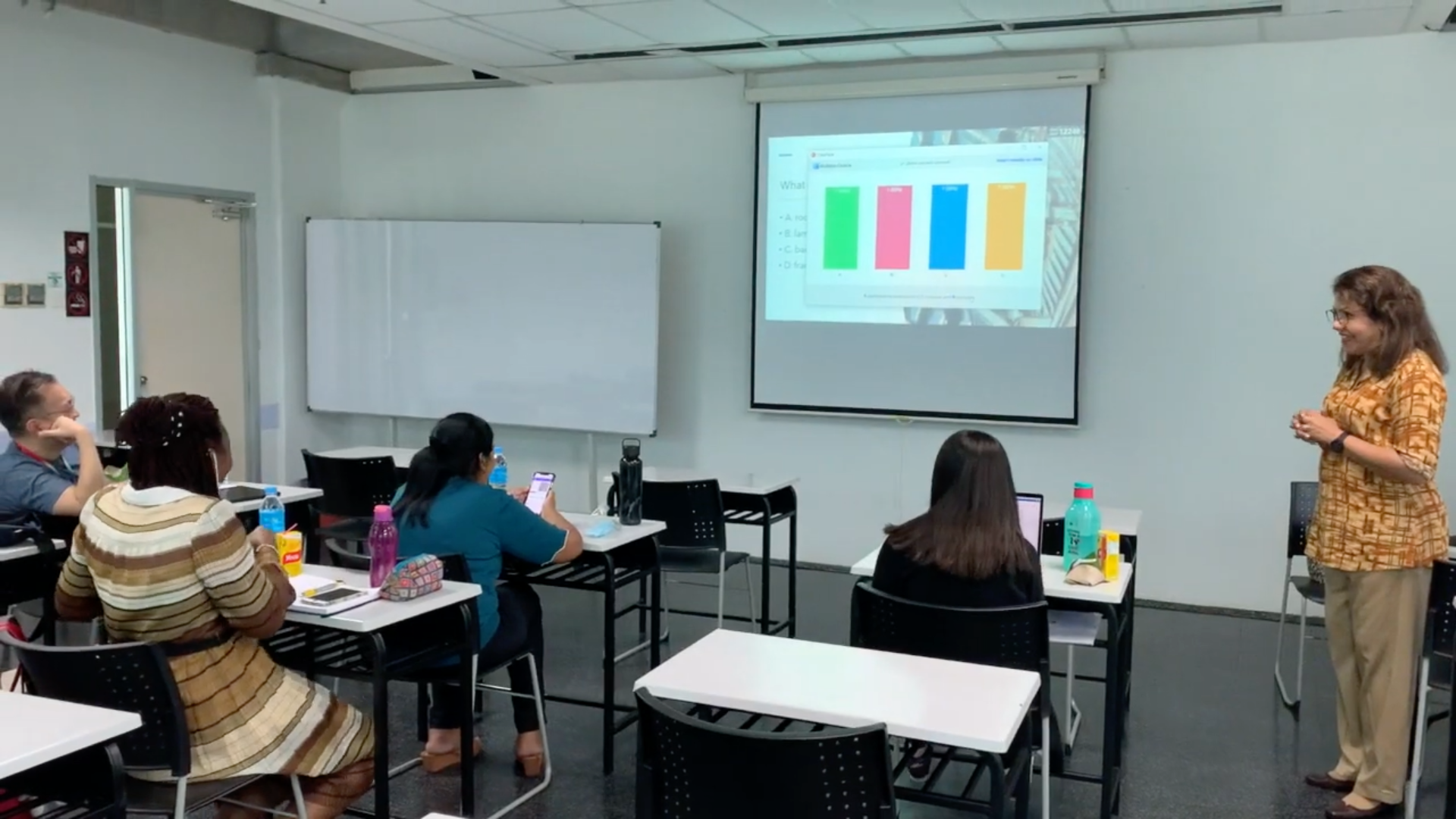Dr. Ambikai S Thuraisingam is a Senior Law Lecturer at Taylor’s University in Selangor, Malaysia. She has been an avid ClassPoint user since August 2020. Below is her take on how ClassPoint has transformed the engagement in her classroom this past year.

In 2020, the World Economic Forum has published a report on the unprecedented granularity of the virtuoso skills needed for the future business world. The prodigy skills include analytical thinking, innovation, active learning, and learning strategies, complex problem solving, and critical thinking. As the work is changing so rapidly, law lecturers grapple with the most challenging task to ensure that the law students are equipped with the aptness and competence to cope and maneuver the learning process, in spite of teaching and learning conducted online in times of COVID-19 pandemic. ClassPoint has helped us achieve these skills and continue to equip our students with skills to lead to a successful future.
How the ClassPoint Journey Began

The new journey to remote learning raised trepidation amongst the law students, particularly the new students entering their first day of university life on an online platform. Lecturers have shared their struggles to teach virtually due to various constraints such as students not switching on their webcam, students not being motivated to learn online, having difficulties teaching critical and analytical skills, and having less engagement or interactivity in online classes to name a few. These difficulties led us to begin using ClassPoint as an initiative to innovate the delivery of law modules in online classes.
ClassPoint’s Effect in the Postgraduate Classroom

The postgraduate students perceive ClassPoint as fun learning. It improves classroom dynamics as the tool provides students with real-time feedback of their performance which allows for adapting teaching activities based on students’ responses to the multiple-choice, word cloud, and short answer questions. Time constraints are minimal as ClassPoint collates and aggregates individual responses to questions within minutes. Therefore, teachers can focus on designing questions, administering the quiz, and, afterward, facilitating discussion about the (in)correct answers. Below are the major ways that using ClassPoint has affected the postgraduate classroom.
1. Increases Participation
The variety of simplified assessments available such as multiple choice and short answer questions, create great inspiration among students to participate during the sessions. They remark that this enhances their level of understanding of the topic that is being taught.
2. Increases Enthusiasm
The students portray great eagerness to be involved in a particular activity and enjoy the competitive environment that’s created to answer questions accurately.
3. Increases Skills
ClassPoint enables students to enhance their creativity, imagination, reasoning, and critical analytical skills. In addition, ClassPoint has led to more positive mindsets and behaviors in students, especially while online learning.
4. Leads to a better learning experience
When students are being taught online, ClassPoint has made them feel more motivated, stimulated, and inspired.
5. Adds emotion to online classes
While online learning, students are able to utilize emotional intelligence during ClassPoint questions and discussions after the questions were completed.
What Students Think of ClassPoint
A research was conducted to assess the effectiveness of the adoption of ClassPoint in Year 2 August, 2020 students, at Taylor’s University and it was found that ClassPoint improves law students’ analytical thinking skills, creative and critical thinking skills. The law students also felt that ClassPoint improves their abilities to be innovative and it also enables them to use their imagination. The research also reveals that ClassPoint develops law students’ evaluation and reasoning skills. Overall, the law students enjoyed the use of ClassPoint as it does increase their interactions within the scope of the borderless learning environment.
| Question | Percentage of those who strongly agreed/agreed | Percentage of those who were neutral | Percentage of those who strongly disagreed/disagreed |
| I feel using ClassPoint in virtual class improve my analytical thinking skills | 53.4% | 18.3% | 28.3% |
| I feel using ClassPoint in virtual class develops my analysis skills | 51.6% | 21.7% | 26.6% |
| I feel using ClassPoint in virtual class improve my critical thinking skills | 53.3% | 25% | 21.6% |
| I feel using ClassPoint in virtual class develops my reasoning skills | 55% | 25% | 20% |
| I feel using ClassPoint in virtual class develops my evaluation skills | 60% | 20% | 20% |
| I feel using ClassPoint in virtual class improve my creative skills | 48.3% | 25% | 26.7% |
| I feel using ClassPoint in virtual class improve my ability to be innovative | 53.3% | 23.3% | 23.3% |
| I feel using ClassPoint in virtual class enables me to use my imagination | 36.7% | 38.3% | 25% |
| I feel using ClassPoint in virtual class develops my willingness to learn | 70% | 13.3% | 16.6% |
How ClassPoint Adds Value for Teachers
- No special IT skills required
- Easy to Download
- Integrates right within Microsoft PowerPoint
- Keeps track of student’s progress and performance over time
- Used in both physical classrooms and virtual classrooms
How ClassPoint Adds Value for Students
- Encourages interactive learning
- Allows students to explore, experience, & learn to make mistakes
- Motivates student’s to be more imaginative, resilient, & creative
- Leads students to become active learners
- Inspires students to be resourceful in innovative learning